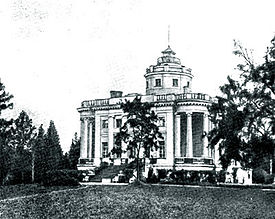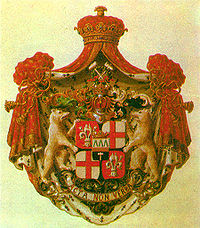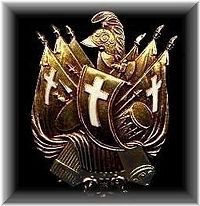- Demidov
-
The Demidov (Russian: Деми́довы) family, also Demidoff, were an influential Russian merchant, industrialist and later chivalry family, possibly second only to the Tsar himself in wealth during the late 18th and early 19th centuries.
Contents
History
Their progenitor, Demid Antufiev, was a free blacksmith from Tula, where their family necropolis is preserved as a museum. His son Nikita Demidov (March 26, 1656 - November 17, 1725) made his fortune by his skill in the manufacture of weapons, and established an iron foundry for the government. Peter the Great, with whom he was a favorite, ennobled him in 1720. For two centuries, the Demidov plants produced a large portion of Russia's iron and steel. The Palace of Westminster was one of many notable buildings constructed of Demidov metal products.
Nikita's son, Akinfiy Demidov (1678–1745), increased his inherited wealth by the discovery and working of gold, silver and copper mines. He also founded the Siberian town of Barnaul, whose central square still bears his name. He also commissioned the Leaning Tower of Nevyansk. His fortune was inherited by his eldest son Prokofi Demidov, whilst his younger son Nikita Akinfievitch Demidov (1724–1789) became an arts patron. Akinfiy's nephew, Pavel Grigoryevich Demidov (1738–1821), was a great traveller and benefactor of Russian scientific education who befriended Carolus Linnaeus and Pallas. He established the Demidov Lyceum in Yaroslavl, the Demidov chair in Natural history at Moscow University, and founded an annual prize for Russian literature, awarded by the Academy of Sciences. A bronze monument to him was installed in Yaroslavl in 1828.
Pavel's nephew, Nikolay Nikitich Demidov (1774–1828), fought in the Napoleonic War with distinction, raised and commanded a regiment to oppose Napoleon's invasion of Russia, and carried on the accumulation of the family wealth from mining; he contributed liberally to the erection of four bridges in St Petersburg, and to the propagation of scientific culture in Moscow. He was created Count by the monarch of Tuscany.
Nikolay's son count Pavel Nikolayevich Demidov (1798–1840) fought as an officer in his father's regiment and received his baptism of fire at the battle of Borodino in 1812. After the war he entered the Chevalier Guards regiment. He received his discharge in 1831 with the rank of captain when he entered civil service as governor of the province of Kursk. In 1834 he entered service in the Ministry of the Exterior as court Huntsmaster, later State Councillor. Count Pavel Demidov is best known for his philanthropy, primarily for having founded the Demidov Prize. He married the well-known society beauty and maid-of-honour to her majesty the Empress Alexandra Feodorovnya Aurore Stjernvall (1808–1903) in 1836. Their son, Pavel Pavlovich Demidov, Prince of San Donato, was the grandfather of Prince Paul of Yugoslavia.
Nikolay's second son, Anatole Nikolayevich Demidov (1813–1870), was a well-known traveller and patron of art. In 1837, he acquired the Italian title of Prince de San Donato and married Princess Mathilde, daughter of Jérôme Bonaparte. His Villa Demidoff is a minor landmark of Florence. Anatole's great grand nephew, Crown Prince Pavel, was regent of Yugoslavia between 1934 and 1941.
The second and last Prince Lopukhin, Paul, was granted the right to pass his title and name to his great-nephew, Nicolas Demidoff, a representative of another branch of this industrialist clan. The revolution impoverished the princes Lopukhin-Demidoff, who settled to Finland where they (for a while) owned the manor of Anttolanhovi near Mikkeli. The dowager princess Natalie deceased in 1957. Their descendants (surname usually rendered as Demidoff) live in Finland.
Hereditary commanders of the Knights Hospitaller
In 1798, Nikolay Nikitich Demidov (who was not a prince, despite of fervent desires of some scribblers to put that title in front of his name) was made a Family Commander of the Russian Grand Priory of the Order of Saint John, by Czar Paul I. Those favoured by Emperor Paul and his son Alexander I of Russia, had been given beneficed Commanderies, and others were encouraged to use their wealth to create their own Commanderies; it is these which were known as Family or Ancestral Commanderies.
In 1811, a Ukase was enacted which brought this institution to an end. However by personal grant of the Emperor, the title of "Hereditary Commander" was held by some descendants who qualified. For a full discussion on the arguments which surround this institution consult the essay "The Foundation Deeds of Family Commanderies of the Order of Malta in Russia." [1]
In 1928 a group of descendants of the original Family Commanders formed an Association. By 1958, the group was chaired by Grand Duke Vladimir (successor to the Russian Throne). This group regulated the claims of the descendants. On 14 April 1958, under his signature of Grand Duke Vladimir decided in favour of Paul Demidoff; "de faire droit à Votre requête et de confirmer Votre titre de Commandeur Héréditaire de l'Union des Descendants des Commandeurs Héréditaires et Chevaliers du Grand Prieuré Russe de l'Ordre de St. Jean de Jérusalem en tant que descendant direct de Demidoff Nicolas fils de Nicétas qui, par grâce de Mon trisaïeul, S.M. l'Empereur Paul I-r Grand Maître de l'Ordre de St. Jean de Jérusalem avait été élevé le 2I Jullet 1799" - in translation; "to grant Your request and to confirm Your title of Hereditary Commander of the Union of the Descendants of the Hereditary Commanders and Knights of the Russian Grand Priory about St John of Jerusalem as a direct descendant of Demidoff Nicholas son of Nicétas which, by grace of My great-great-grandfather, H.M. the Emperor Paul I Grand Master of the Order of St John of Jerusalem had been elevated 21 July 1799" [2]
Alexandre Tissot Demidoff (of Berkshire England) chairs an Association which seeks to continue the humanitarian tradition of the Russian Grand Priory, to which Alexander Demidoff (of Paris, and son of Paul Demidoff above) belongs.
The Family Commanderies established during the reigns of Paul I and Alexander I of Russia as part of the non-Catholic Grand Priory include those of:
Narychkine, Count Chéréméteff, Prince Youssoupoff †, Stroganov †, Count Samoiloif ‡, Prince Belosselsky, Prince Dolgoroukov, Davydov, Prince Barytinsky, Prince Démidoff, Prince Troubetzkoy, Count Worontzoff, Maruzzi †, Beklechev †, Prince Tioufiakine †, Count Olsoufieff, Gerebtzoff, Count Strogonoff †, Boutourline, Potemkine †, Tchirikoff †, Prince Khilkoff ‡, Prince Odoevsky †, and Prince Youssoupoff †.
Key. † Direct Male line from the first Commander extinct. ‡ Direct Male line is extinct, but the family was reinstated via the female line by the Imperium.
 Alexander Demidov's chateau in Taitsy near Gatchina (1773–76) was designed by his brother-in-law, Ivan Starov.
Alexander Demidov's chateau in Taitsy near Gatchina (1773–76) was designed by his brother-in-law, Ivan Starov.
See also
- Demidov Square
- Demidovsky Pillar, Barnaul
- Demidovsky Pillar, Yaroslavl
- Demidov collection
- Prokofi Demidov
- Aurora Demidov
- Pavel Grigoryevich Demidov
- Pavel Demidov
- Pavel Pavlovitch Demidov
- Alla Demidova
- Villa San Donato
Publications
- Anatole Demidoff, Travels in Southern Russia, and the Crimea; through Hungary, Wallachia, & Modavia, during the Year 1837, London, J. Mitchell, 1853, LCCN 05-033883
External links
- House of Demidov on Commons
- History and portraits of the Demidovs
- Genealogy of the Demidovs as Princes di San-Donato
- Anatole and Mathilde: Story of Their Marriage
- History of the Demidov Family (from the website of the Demidov University)
- http://pages.pacificcoast.net/~demidow/dzieje.html
 This article incorporates text from a publication now in the public domain: Chisholm, Hugh, ed (1911). Encyclopædia Britannica (11th ed.). Cambridge University Press.Categories:
This article incorporates text from a publication now in the public domain: Chisholm, Hugh, ed (1911). Encyclopædia Britannica (11th ed.). Cambridge University Press.Categories:- Demidov family
- Russian noble families
Wikimedia Foundation. 2010.


